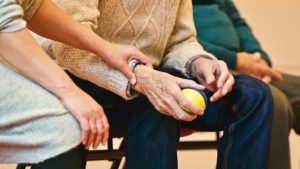If your loved one has suffered from a stroke, physical, cognitive, and emotional challenges may develop as a result. The recovery time following a stroke is different for everybody, and it can take weeks, months, or even years. While some people recover fully, others develop lifelong or long-term disabilities. Remember that handling stroke aftermath can be tiring, but you can make substantial progress with consistent effort and patience. The following tips can help you recognize and manage common issues as you care for a loved one who has survived a stroke.
Identify Stroke Symptoms
One of the best ways of helping someone to recover from a stroke entail incorporating preventative measures like knowing stroke symptoms because instant treatment can be lifesaving. Also, it impacts full recovery chances. Unluckily, stroke survivors have a high probability of a second stroke attack. Research shows that one in every four stroke survivors will experience another one.
The risk of experiencing a second stroke is roughly 40% higher within the first five years following the first one. The good news is that medical intervention and lifestyle changes can help avoid approximately 80% of secondary strokes.
Incorporate Light Exercises
Including leg exercises to a stroke survivor is vital for a quick recovery. Although every patient should have a personalized exercise routine, you can find helpful Gait training exercises for stroke patients that are safe and easy to do at home. These stretching and low-impact exercises for stroke recovery come in handy in helping your loved ones have improved mobility.
Be Mindful of Communication
One of the leading and most annoying stroke’s side effects is the incapacity to speak or recognize speech. It is estimated that about 25% – 40% of individuals who get stroke develop aphasia, damage to the brain, mainly the left side that manages language. Therefore, if you are dealing with a loved one with this condition, you should use short and simple sentences. It would help if you also tried to be patient when communicating with them because it’s only their capability to speak that’s affected; their intelligence remains intact.
Dealing with PSTD
After a stroke, it’s pretty standard for stroke survivors to experience Post-Traumatic Stress Disorder (PTSD). PSTD’s typical symptoms include the person experiencing disturbing events recurrently in the form of hallucinations. These nightmares are usually accompanied by the victim’s feelings of self-doubt, unyielding anxiety, and improper guilt over their condition. The best way of managing this condition involves using medications like anti-anxiety medications and antidepressants. Also, psychotherapy is essential.
Decreasing Stress and Inflammation
Body inflammation can lead to other problems. For example, a stressed body produces a hormone known as cortisol floods. This hormone affects the pH levels resulting in acidity. Extended high acidity levels kill essential body bacteria while enhancing the rise of bad ones. Ultimately, it results in a weak immune system.
The good news is that using a natural probiotic, such as yogurt is an excellent way of stimulating good bacteria in the body. Also, taking supplement drinks can boost immunity significantly. Besides balancing the pH level, incorporating stress management exercises like deep breathing, yoga, meditation, and tai chi can limit an individual’s cortisol levels.
Don’t Overlook Falls
It’s common to experience falls after a stroke. Take your loved one to an emergency room instantly if the fall is serious and leads to the extreme pain, bruising, and bleeding. It would also be valuable to visit a physician to treat your loved one who experiences slight falls more than twice in six months.
Manage Depression Before It Worsens
While post-stroke depression is common amongst many stroke survivors, it is essential to suppress it before it deters recovery. Consulting a healthcare expert to create a plan of action is advisable because post-stroke depression can enormously impact your loved one’s rehabilitation and recovery.
Be Aware of Vascular Dementia
Vascular dementia is a typical issue amongst stroke survivors. Maintaining blood sugar levels at optimal levels is advised. So, if the victim has diabetes, you must be cautious of insulin and blood sugar levels.
Professional Assistance for Stroke Survivors
The stroke recovery process is a daunting one, and it’s full of twists, turns, ups, and downs. It takes dedication and hard work to recoup physical and mental functionality after a stroke. Fortunately, the tips mentioned above come in handy in helping you recognize and overcome most challenges linked to recovery.

